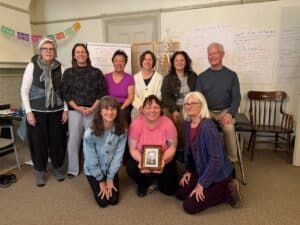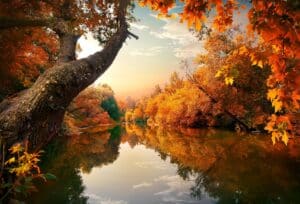Five Elements, Portland and the Eagle Creek Fire
Late Summer in Portland (the Earth Element) has brought us face-to-face with the Five Element cycle in the rawest form. As the Eagle Creek fire in Columbia River Gorge continues to burn, we see at play the fundamental energy of the creation or “sheng” cycle of Five Element theory.
The ancient Chinese saw the Wood Element as the “mother” of Fire, and Fire as the “mother” of Earth. Wood provides the fuel that nourishes the flames. Fire transforms that fuel into ash, returns its energy to the soil and restores the Earth Element. Potassium, calcium, magnesium and other trace elements are released into the soil, ready to be taken up as life starts anew. Nature wastes nothing.
This year, Portlanders have watched our beloved, iconic Columbia River Gorge burn. It feels as if life has been cut short. Our natural jewel, the Gorge, will never be the same within our lifespan. On the surface, it looks like total destruction. In our shock, grief, and anger, it is hard to take the long view and realize that forest succession, left on its own, will restore the land.
Late Summer and the Earth Element: the Annual Cycle
Late Summer is the season of the Earth Element. In Five Element acupuncture, we understand the Five Elements in terms of the annual cycle of the seasons, and in connection to the energetic cycles within the body/mind/spirit.
Late Summer is the “fifth season,” overlooked in Western culture’s “four seasons.” It is the time when the heat of Summer (the Fire Element) has begun to mellow and the days grow short. Flowers have passed the peak of bloom, and things look a little tired and faded. In the plant world, the focus is on ripening fruit and setting seed.
Late Summer is intimately connected with the harvest and the nourishment provided by the Earth. A healthy Earth Element within the body/mind/spirit gives us the ability to gather and be nourished by the fruits of our labors. A good harvest brings us a sense of security and comfort, sustaining us through the colder months ahead.
Disharmony of Earth and Fire
What happens if Summer lasts too long? In proper measure, Summer (the Fire Element) brings the warmth and sunlight that gives life to plants, allowing abundant photosynthesis and growth. In the human spirit, the Fire Element gives us the capacity for love and the warmth of relationship, communication, and understanding. A robust Fire Element gives us the ability to give and receive.
If Summer goes on too long, the Fire Element gets out of control. Too much heat and sunlight can lead to drought and a poor harvest, and even forest fires. Instead of a healthy, vital transition to Earth Element and the season of harvest, plants wither and dry up – or perhaps ignite. The Earth Element is distressed and overwhelmed.
In Portland, Summer is typically mild and the Fire Element often seems in short supply. In 2017, it feels like Summer has gone on too long and too intensely. Our native temperate rainforests are suffering.
What does an excessive Fire Element look like in the body/mind/spirit? This may be the person whose passions burn too brightly, someone who “wears their heart on their sleeve.” Bubbly and talkative, he/she may feel desperate to be understood and connect. Fire Element opens and shuts the gates of relationship, and governs the Heart energy. If the gates are left open too wide, the person will be vulnerable and exposed, with no barriers to intimacy. He/she may open up at the wrong time, or to the wrong people.
When Fire is distressed, so too is its “child”, the Earth Element. This may appear as someone who is unable to take in nourishment in body/mind/spirit, and never feels the safety and security of an abundant harvest. He/she may have difficulty following a project through to fruition and gathering in the fruits of his/her labors. He/she “abandons the crops in the fields.”
Cycles Beyond Cycles
Beyond the annual cycle of the seasons, there are other cycles in nature that also embody the energy of the Five Elements. Some of these cycles are beyond immediate human experience: planetary cycles linked to geological time, and ecological cycles that are simply outside of human observation. Traditional cultures understood these larger cycles through ancestral wisdom and intimate connection to the land. In modern times, we rely on intellect and abstract thought (i.e., science) for understanding.
For forest environments, wildfires are part of the natural cycle that renews biodiversity and allows life to thrive. Different species thrive in different stages of the recovery after a fire. Some species, like the whitebark pine, rely on fire both for control of insect populations and for reproduction. Moderate fires clear the forest understory of small trees and ground cover, removing fuel and renewing nutrients in the soil. If fire is suppressed, more severe fires burn in the crowns of trees and are also more lethal to roots as the soil heats up.
The Human-Wild Interface: Harmony Lost
At the boundary of wilderness and human habitation, safety is the top concern. In places like the Columbia Gorge, we suppress forest fires to protect people and their communities. Fire suppression results in a build-up of fuel that would otherwise have burned off in smaller wildfires, resulting in bigger and more devastating burns when things get out of control.
Beyond the cycles of forest ecology, the planet Earth goes through cosmic cycles of heating and cooling. Forests and other life systems come and go, adapting to epochal change. We are in the Anthropocene, a geological epoch of rapid global warming and widespread extinction, brought about by human activity. The result for Portland, Oregon is warmer, drier summers throughout the Pacific Northwest. Forest fires have increased, thanks in part to climate change.
Not all forest fires start out wild. Painfully, about half are started by human carelessness or reckless. The Columbia Gorge fire was started by teens throwing fireworks on dry wood. It’s a disturbing, destructive act that, like a murder, leaves us wondering about the minds of the perpetrators. Violence creates psychic disharmony and pain. It ripples through our community and amplifies our grief and loss.
At the human-wild interface, our connection to nature seems lost in so many ways: climate change, fire suppression, and human recklessness.
Self-Healing System
It’s easy to focus on the obvious disharmony between humans and the wild. We can see the disruption we’ve caused to natural systems and cycles. None the less, life is resilient. Nature is a self-healing system. Nature has the power of balance.
Humans are part of nature, not separate from it. We are simply Mother Earth’s most recent experiment in a dominant species. The Earth will survive the Anthropocene, but will we? The biosphere is undergoing some remodeling, as the Earth attempts to heal. How long will the human species last?
Nature’s power of balance is also within us. We too are self-healing systems. The body/mind/spirit will always do its best to heal. We are conscious beings, with an ability to make choices in our lives. None of us alive today will ever know how long the human species will survive. Yet every choice we make towards balance, harmony, and healing – physical, emotional, spiritual – is a choice with impact for generations. Our ancestors’ choices shaped our lives, and we are the ancestors of those to come.
The wisdom of the Five Elements is a gift from our ancestors. In the end, it is nothing but a construction of the human mind – something to give us a way to grasp and make sense of the powers of the world we live within, a way to intuitively understand forces beyond our control. We can use the Five Elements to guide our lives, step by step, choice by choice, towards harmony and balance. What choice will you make?



